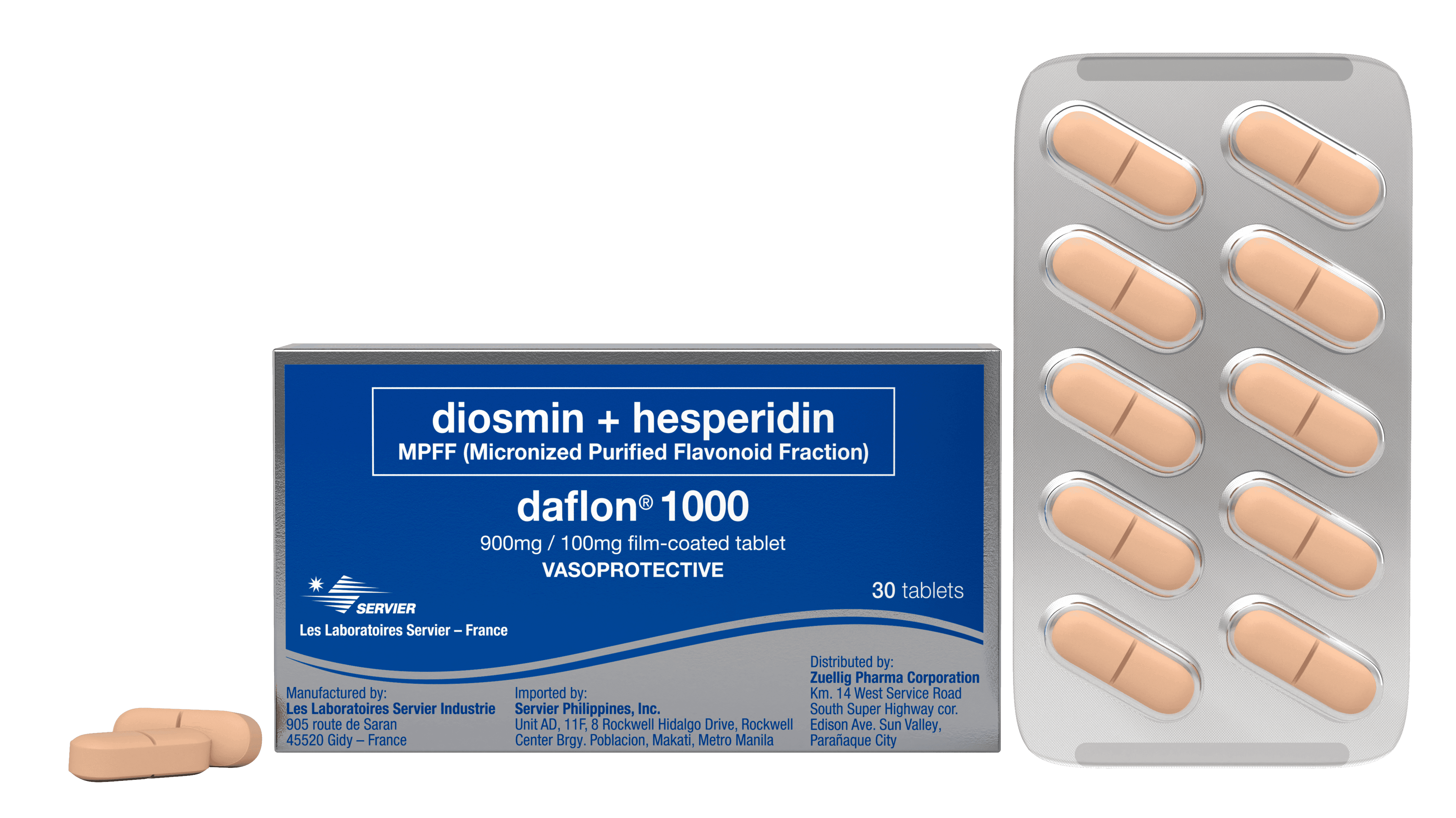Causes of Hemorrhoids
Treatment for Hemorrhoids
Hemorrhoids
6/18/2025
How Long Do Hemorrhoids Last During Pregnancy?
Overview
- Hemorrhoids are a common issue during pregnancy, causing discomfort such as pain, itching, and swelling.
- While symptoms can vary in duration, factors like hormonal changes, physical pressure, and lifestyle choices contribute to their development.
- This article explores the causes of pregnancy-related hemorrhoids and how Diosmin + Hesperidin (Daflon® 1000) , a medication with diosmin and hesperidin, can help manage symptoms, improve vascular health, and reduce future flare-ups.
Introduction
Hemorrhoids are a common concern during pregnancy. This condition can cause sharp pain, itching, burning sensations, swelling, and bleeding. The discomfort can make sitting for long periods difficult, affect sleep quality, and lead to anxiety about bowel movements.
So, how long do hemorrhoids last during pregnancy? The duration can vary. Smaller hemorrhoids may go away on their own within a few days, while larger or more painful ones might take a little longer to heal.
Fortunately, there are simple steps you can take to manage the discomfort. Most pregnancy-related hemorrhoids improve after childbirth, although some women may experience symptoms for a bit longer.

What Can Cause Hemorrhoids during Pregnancy?
As the body adjusts to pregnancy, several factors can increase the risk of developing hemorrhoids1. From changes in hormone levels to the added pressure from the growing uterus, these shifts can lead to discomfort and swelling in the rectal area.
Hormonal Changes
During pregnancy, hormonal changes play a key role in the development of hemorrhoids2. The hormone progesterone, which increases during pregnancy, relaxes the walls of blood vessels.
This can cause veins to swell and become varicose, contributing to the formation of hemorrhoids. Along with this, the increased blood volume that comes with pregnancy can cause veins, especially in the pelvic area, to enlarge, adding to the likelihood of hemorrhoids developing.
These changes also affect muscle tone, including the muscles in bowel movements. As muscle tone weakens, it can become harder to have regular bowel movements, which can lead to straining, which is a common trigger for hemorrhoids.
Physical Pressure
The enlarging uterus pressures the blood vessels in the pelvic area as pregnancy progresses, especially around the rectum2. This causes veins to swell and become engorged, leading to hemorrhoids. How long hemorrhoids last during pregnancy can vary, but they often result from these types of changes.
Many pregnant women experience constipation because of hormonal changes that slow down digestion. Straining during bowel movements to pass hard stools increases the pressure on the rectal veins, which can cause them to become inflamed and swollen, resulting in hemorrhoids.
Sitting or standing for long periods can cause blood to pool in the lower body, increasing pressure on the veins in the anal area. This pooling can raise the risk of developing hemorrhoids, especially when combined with other factors like weight gain and hormonal changes.
Lifestyle
A diet low in fiber can lead to constipation, which is a major risk factor for hemorrhoids3. When stools are hard and difficult to pass, straining during bowel movements increases pressure on the rectal veins, leading to swelling and hemorrhoid formation.
Insufficient fluid intake can exacerbate constipation. That’s why staying hydrated is crucial for softening stools and promoting regular bowel movements.
Lack of physical activity can slow digestion and increase constipation, raising the risk of hemorrhoids3. Regular exercise improves circulation and bowel function, while also reducing pelvic pressure.
Although weight gain is normal during pregnancy, excessive weight can stress pelvic veins. A balanced diet and staying active can help manage weight and reduce the risk of hemorrhoids.

How Can Diosmin + Hesperidin (Daflon® 1000) Help Manage Hemorrhoids during Pregnancy?
Finding pregnancy-friendly ways to manage and alleviate hemorrhoid symptoms can be challenging. That’s why Diosmin + Hesperidin (Daflon® 1000) , a medication containing diosmin and hesperidin, is considered for managing hemorrhoids during pregnancy. But, how exactly can Diosmin + Hesperidin (Daflon® 1000) help alleviate the discomfort associated with hemorrhoids during this time?
Symptom Relief
Diosmin + Hesperidin (Daflon® 1000) may help alleviate hemorrhoid symptoms by improving venous circulation and reducing inflammation4. This can lead to decreased pain and discomfort in the rectal area caused by swollen veins.
Studies suggest that Diosmin + Hesperidin (Daflon® 1000) can be effective for short-term treatment of hemorrhoids during pregnancy, particularly in managing symptoms leading up to delivery. It was shown to be safe and well-tolerated when used for a median of eight weeks before delivery5.
However, pregnant women considering Diosmin + Hesperidin (Daflon® 1000) should consult their healthcare provider to discuss the potential benefits and risks based on their individual health needs.
Improved Vascular Health
The active ingredients in Diosmin + Hesperidin (Daflon® 1000) enhance venous tone and improve microcirculation6, reducing inflammation and capillary permeability. This action addresses the underlying causes of hemorrhoids, rather than just alleviating symptoms.
Its anti-inflammatory properties help reduce swelling and inflammation in the veins, which is particularly beneficial for hemorrhoids7. It alleviates the pain and discomfort caused by swollen veins.
Diosmin + Hesperidin (Daflon® 1000) also supports microcirculation by reducing capillary permeability and preventing fluid leakage into surrounding tissues6. This helps decrease edema (swelling) and improve blood flow in the affected areas, which are crucial for healing and symptom relief.
Decreased Frequency of Future Flare-ups
Using Diosmin + Hesperidin (Daflon® 1000) regularly may lead to long-term improvements in your vascular health, which could lessen the frequency and severity of future hemorrhoid flare-ups. By strengthening blood vessel walls, the medication can reduce the dilation and inflammation that contribute to hemorrhoids8.
Diosmin + Hesperidin (Daflon® 1000) is helpful for both immediate relief and ongoing care. If you have chronic or recurrent hemorrhoids, taking it daily may help manage your symptoms and lower the risk of future issues. Research has shown that up to 71% of users9 experienced fewer flare-ups when incorporating Diosmin + Hesperidin (Daflon® 1000) into their treatment.
Clinical studies suggest that Diosmin + Hesperidin (Daflon® 1000) may also lead to faster recovery times. One study found that those using Diosmin + Hesperidin (Daflon® 1000) had a mean recovery time of about 56.5 days8, compared to 61.04 days for those receiving standard treatments. A quicker recovery may reduce the chance of recurrence.
Key Takeaway
Managing hemorrhoid symptoms during pregnancy can be tricky. While hemorrhoids during pregnancy can last from a few days to several weeks, seeking proper treatment can help alleviate discomfort and promote faster recovery. That’s why it’s important to consider safe options like Diosmin + Hesperidin (Daflon® 1000) . However, pregnant women should always check with their healthcare provider before starting any medication.
Experiencing hemorrhoids during pregnancy? Try Diosmin + Hesperidin (Daflon® 1000) to help relieve symptoms like pain, swelling, and bleeding. Speak with your healthcare provider to see if it’s right for you.
REFERENCES
- https://www.stanfordchildrens.org/en/topic/default?id=hemorrhoids-and-varicose-veins-in-pregnancy-134-9
- https://www.vejthani.com/2022/01/4-reasons-why-hemorrhoids-appear-during-pregnancy/
- https://www.honorhealth.com/healthy-living/hemorrhoids-during-pregnancy
- https://www.medicoverhospitals.in/articles/daflon-for-piles
- https://pubmed.ncbi.nlm.nih.gov/9184951/
- https://pubmed.ncbi.nlm.nih.gov/11510597/
- https://www.medicoverhospitals.in/articles/daflon-500mg-tablet
- https://www.eurekaselect.com/article/135038
- https://www.phlebolymphology.org/mpff-500-mg-in-the-management-of-acute-and-recurrent-hemorrhoidal-disease/
- https://pubmed.ncbi.nlm.nih.gov/8203790/
2026